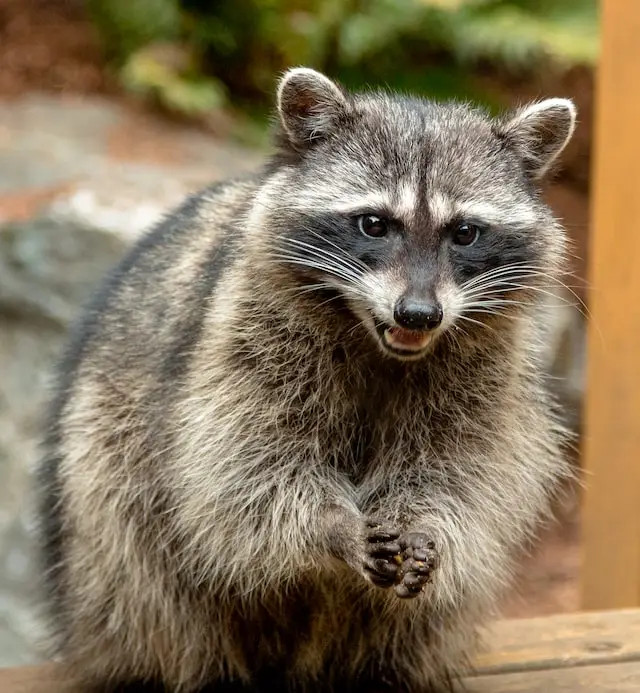
DANGERS OF RACCOON URINE AND DROPPINGS
Raccoon droppings and urine are extremely dangerous. Like most rodent droppings one should treat raccoon droppings with caution because prevention is better than cure. They carry with them germs, bacteria, viruses, and a high risk of contagion.
What makes raccoon feces dangerous?
Raccoon excrement is hazardous because many of them contain small roundworm eggs that, if unintentionally consumed or inhaled, can infect people. It can result in serious sickness. Although they are uncommon, these infections can cause fatal irreparable damage to the brain, heart, and sometimes the eyes.
Let’s have a look at some of the health risks raccoon droppings or urine may pose:
ROUNDWORMS
Baylisascaris procyonis, a roundworm primarily found in raccoons can be dangerous to humans. Infected raccoons excrete roundworm eggs, which humans can contract by eating the eggs. Exposure to raccoon droppings is highly dangerous to people. The danger of infection is greater in young children or those with developmental disabilities because they may be more prone to ingest contaminated soil, items, etc.
CANINE DISTEMPER
Rarely, the excretions may include rabies (if the raccoon is diseased), but they may also contain viruses that harm your dogs, such as canine distemper. A raccoon’s behaviour will alter if it contracts canine distemper. When a raccoon is acting violently toward other animals or people while out searching for food during the day, it may be suffering from this disease.
Your dog may become seriously ill if while digging in your yard, it ingests some of the animal waste.
Raccoon roundworms can infect pets, cattle, and wildlife, which can lead to the development of identical symptoms and even death.
RISK OF CONTAMINATION
Hand-to-mouth contact with contaminated objects like soil, wood, and leaves can also cause human infection.
Above all children (ages 6 months to 9) are more susceptible to illness, especially given their propensity to put everything in their mouths. Cases of sickness have been reported in both adults and children in Canada, the US (Washington, Illinois, Colorado, and California), Europe, Japan, and other regions.
LARVA MIGRAINE
Neural larva migraine (NLM) is the most serious disorder caused by raccoon feces. NLM is brought on by larval migration into the central nervous system, which harms the brain and spinal cord. Lethargy, irritability, lack of coordination in the muscles, hyperreflexia, seizures, and paralysis are some symptoms of NLM.
Advanced NLM infection frequently results in unconsciousness or patient death.
LEPTOSPIROSIS
Leptospirosis is a microbial illness. It can be contracted by contacting animal waste such as urine and feces. Animals like raccoons and rodents can spread the bacteria that cause leptospirosis to humans If they are not adequately stopped from entering your home.
GIARDIASIS
Giardiasis, like roundworms, is introduced to people by coming into contact with parasites in raccoon urine or excrement. This disease normally goes away on its own and is mild in comparison to other deadly diseases that raccoons might transmit. It can cause nausea, pains in the stomach, and diarrhea in people.
SALMONELLA
Direct contact with an infected animal or eating its feces are the two ways to catch a disease like Salmonella. In a 2007 Ontario research, it was discovered that 45% of the examined raccoons (27% in rural regions and 65% in and around city areas) contained salmonella germs in their stools.
A conducive environment is a favorable breeding space for these bacteria. They are also capable of dormancy. This sadly means that can continue a raccoon nuisance for a prolonged period of time.
High temperature, severe diarrhea, and stomach pain are all related issues.
Raccoons typically transmit these diseases through contaminated food, drink, or soil sources. They also occasionally do so by coming in contact with humans (biting or scratching). But it’s getting more and harder to avoid these encounters as a result of Ontario’s raccoon population being so vast and constantly expanding. The most sensible actions we can take are to use common sense and to always be aware of what is going on. Routinely monitor the attic for their presence, and if you think they may have sneaked into your home, call a wildlife expert.
Raccoons pose a variety of health concerns. By practicing strict hygiene, you may defend your family and yourself from raccoon problems. For removing raccoons we can only rely on professionals.
Raccoons urine and Droppings Cleanup in Colorado & Nearby Areas…
Do raccoon droppings in your house or place of business cause problems? Call ECOS for immediate assistance.
In an attempt to make your existence healthier, simpler, and better, we at ECOS are dedicated to offering trustworthy raccoon feces and urine cleanup services.

